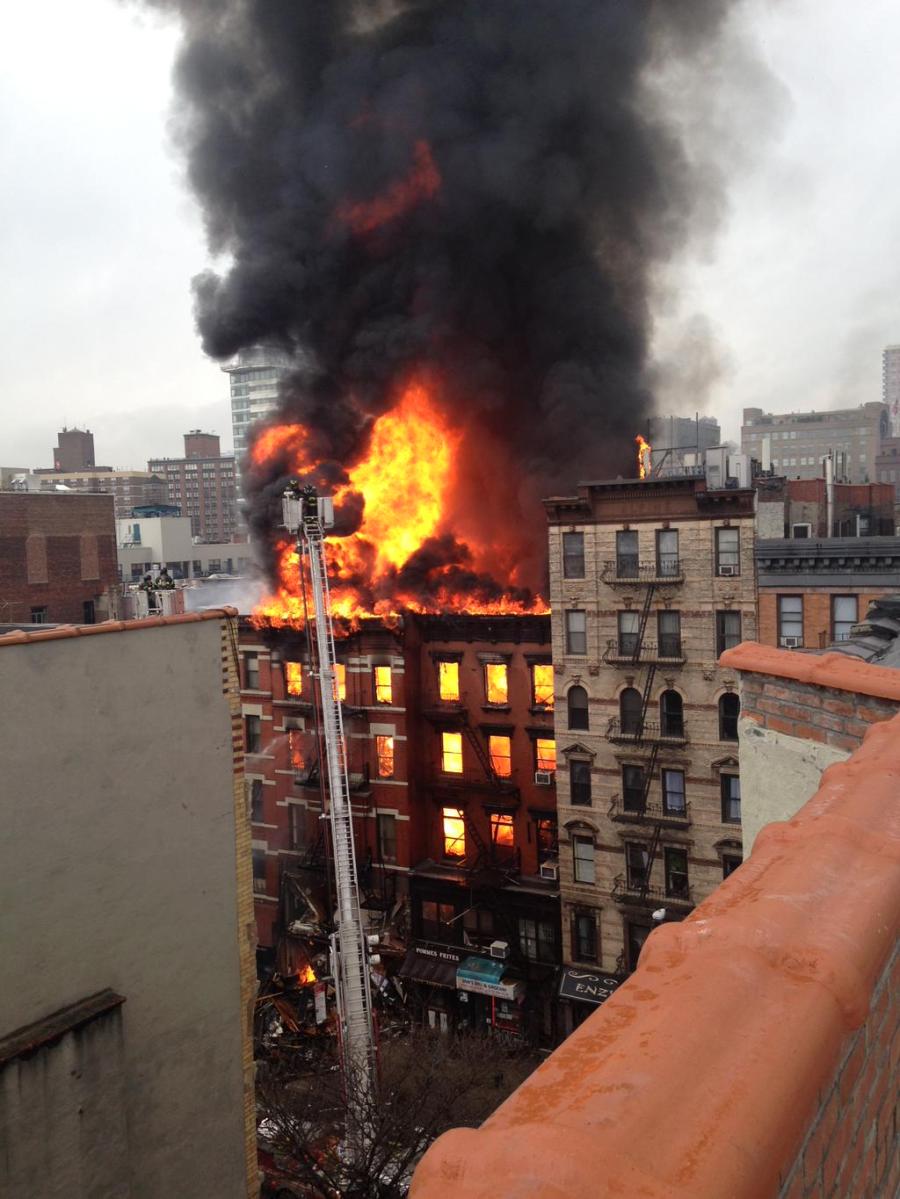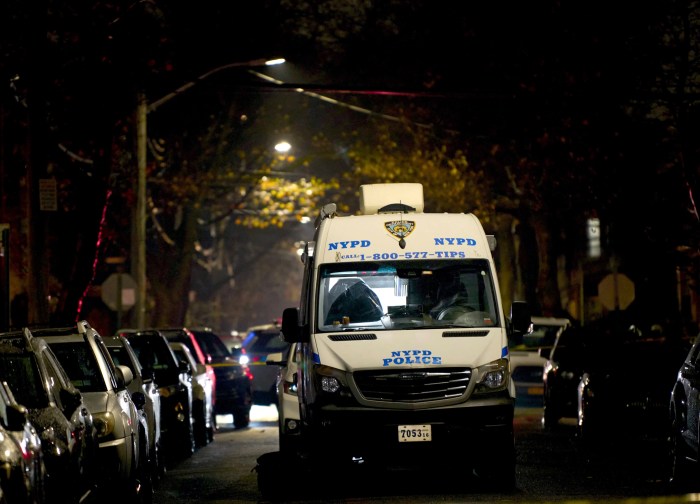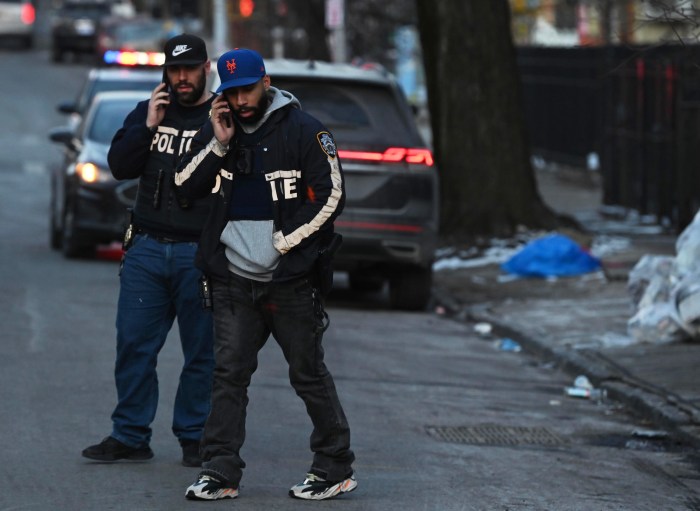BY LINCOLN ANDERSON Updated Sat., Sept. 14, 4:20 p.m. | The prosecution will try to prove that greed and illegally cutting corners caused the tragic East Village gas explosion more than three years ago that killed two young men and leveled three buildings.
Meanwhile, the defense will attempt to shift the blame away from the landlord and two contractors on trial, putting the guilt on Con Edison — or maybe even no one — in the shocking disaster that rocked Second Ave. and E. Seventh St.
That much was clear from the attorneys’ opening arguments in State Supreme Court on Mon., Sept. 9, at 100 Centre St. It’s expected the trial will last around three months.
Maria Hrynenko leaving the courtroom during a break after opening arguments on Mon., Sept. 9. (Video by The Villager)
Landlord Maria Hrynenko, general contractor Dilber Kukic and unlicensed plumber Athanasios “Jerry” Ioannidis are charged with manslaughter in the second degree and criminally negligent homicide in the deaths of Nicholas Figueroa and Moses Lucon Yac. Maria’s son Michael Hrynenko also stood to face these charges at trial but died in 2017.
Maria Hrynenko owned Nos. 119 and 121 Second Ave., two of the buildings destroyed in the explosion and subsequent raging fire.
On March 26, 2015, Figueroa, 23, was on a lunch date at Sushi Park restaurant, on the ground floor of 121 Second Ave., where Yac, 27, was working as a busboy, when the explosion occurred, killing them both from blunt impact and smoke inhalation.
Thirteen other individuals were injured by the blast — including a tourist who lost an eye. For those injuries, the three defendants are also being charged with multiple counts of assault in either the second or third degree.
An 18-member jury, including 12 men and six women, is hearing the case, presided over by Judge Michael Obus. During the trial’s first day, contractor Kukic listened through headphones as two men took shifts translating for him.
Assistant District Attorney Randolph Clarke Jr. started things off by saying the explosion happened because of “greed undeterred.” The disaster, he said, was caused by “an unauthorized gas-delivery system,” O.K.’d by Hrynenko and built by Kukic, that siphoned gas from 119 Second Ave. and sent it to 121 Second Ave. The result was that “a virtual bomb was lurking” underneath the buildings, Clarke said.
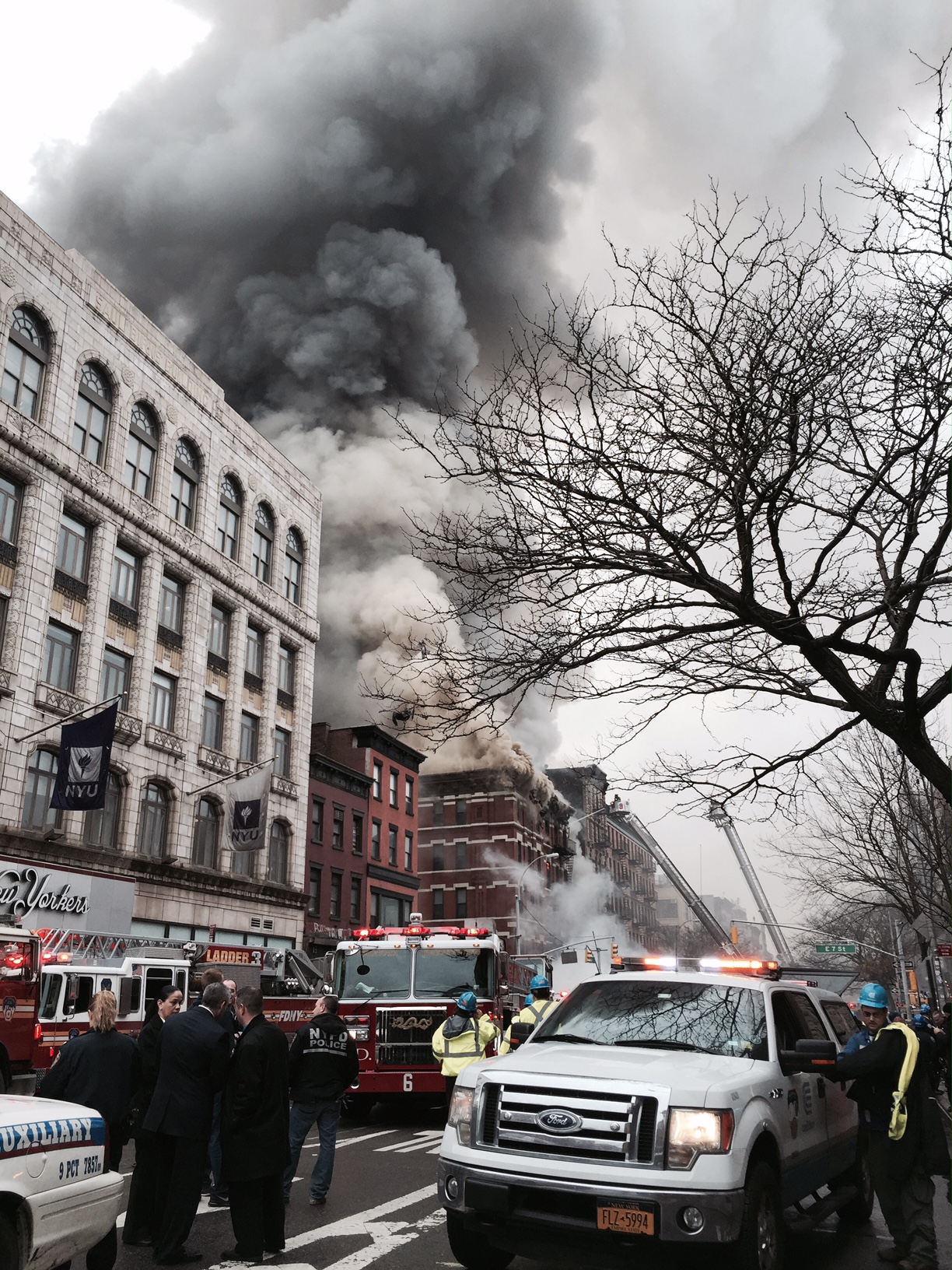
The defendants did what they did, well knowing it was dangerous, Clarke stated.
“The defendants took a chance. They rolled the dice,” he said. “The financial stakes were high for all these defendants, and that’s why they took this risk.”
The rigged-up system was hidden behind a wall where Con Ed inspectors could not see it, he stressed. To create the illegal apparatus, they used Ioannidis, an unlicensed plumber.
However, Clarke said, “You don’t need a plumbing license to know that you don’t mess with natural gas.”
Hrynenko had renovated the apartments at 121 Second Ave. and was leasing them, but the building lacked its own gas connection, the A.D.A. noted. It would be a problem if tenants didn’t have hot water or gas for cooking. As a result, what the defendants did, according to the prosecutor, initially was to hook up yellow “flex hoses” — typically used to connect appliances to gas meters — to the gas that was going to Sushi Park restaurant. According to reports, Sushi Park was the only part of 121 Second Ave. that was authorized to be receiving gas.
“And surprise, surprise, there was a leak,” Clarke said.
According to reports, following a Con Ed inspection of that leak, resulting in the gas being turned off for 10 days, the defendants decided to create a hidden system to tap into the gas line of 119 Second Ave. to service the apartments in 121 Second Ave.
On the day of the explosion, Con Ed inspectors again visited 119 Second Ave. The defendants are basically accused of trying to trick the inspectors by manipulating the hidden controls to affect where the gas was flowing — yet they allegedly left valves open that should have been closed.
Four minutes after the inspectors left, someone from Sushi Park called the landlord to report a gas leak, Clarke said. Michael Hrynenko and Kukic promptly ran into the restaurant, then into the basement of 119 Second Ave. through an entrance on E. Seventh St.
“Within moments of them entering that basement, there was an explosion,” the prosecutor recounted.
The blast happened less than a half hour after the Con Ed inspectors had left.
Clarke said there was a hole between the two buildings through which a pipe passed to deliver the gas from 119 to 121 Second Ave. Weeks after the explosion, investigators sifting down through the rubble recovered four gas valves that were all in the open position, he noted. Yet, he admitted, not all the gas valves were recovered.
Michael Burke, an attorney representing Maria Hrynenko, noted that Michael Hrynenko was injured in the explosion.
“He was burned on his face and body,” he said.
He said of Maria Hrynenko, “The evidence does not indicate she was aware of the problem.”
He added that she never wanted to be a landlord but became one after her husband, Michael — who ran the Kiev restaurant, at Second Ave. and E. Seventh St. — died in 2014. He said she delegated the renovation work on 121 Second Ave. — budgeted at $700,000 — to licensed professionals. He noted that Con Ed had previously twice locked the gas valves at 119 Second Ave., in August and September 2014, then unlocked them each time shortly afterward.
“Con Ed has the greatest degree of knowledge of what’s at risk,” he stated.
He said if Con Ed could not tell the situation was dangerous, then how could Maria Hrynenko know? He noted that it was the utility that took the photo — shown in court — of the gas apparatus with the yellow flex tubing.
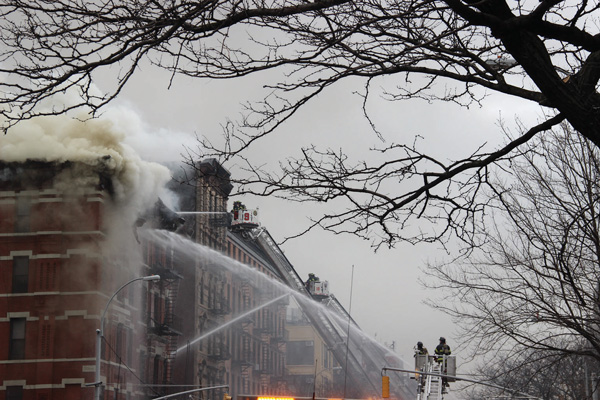
Burke said that on the day of the explosion, Sushi Park workers turned on four gas valves to make lunch for themselves. Around 2 p.m., they smelled gas.
“They heard a hissing sound in the kitchen area…and boom, it blew up,” he recounted.
Burke accused the Manhattan district attorney of focusing on the basement of 119 Second Ave., when the evidence instead pointed to a problem with the gas at Sushi Park.
It was “a rush to judgment,” he charged. “They just focused on the basement.”
More to the point, he stressed, the main gas shutoff valve was not recovered.
“They have no proof that the gas was on or off without that valve,” he declared.
Marc Agnifilo, the attorney for Kukic, noted that his client “probably saved [the] life” of Michael Hrynenko after they both ran into the basement of 119 Second Ave. and the explosion occurred.
“Flex piping is safe,” he asserted of the hoses that were used in the jerry-rigged gas system. “It’s used to hook up driers, ovens. But it’s not the code for hooking up other than appliances,” he conceded.
He said that Maria Hrynenko wasn’t guilty of “stealing services” by gas siphoning, since she owned both buildings.
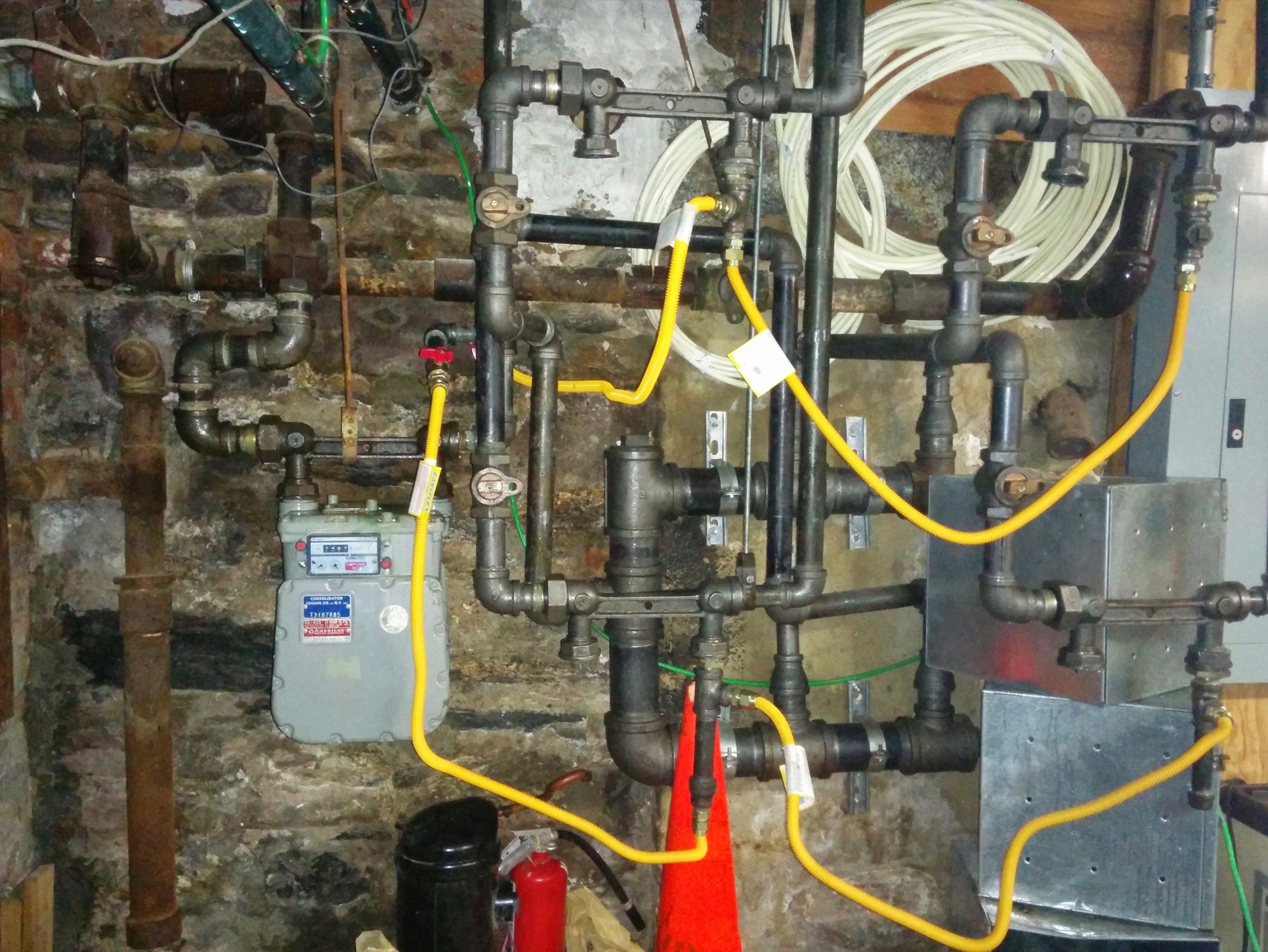
“No one is saying they smelled gas in the basement” of 119 Second Ave., he stated. “They smelled gas in the kitchen of Sushi Park and heard a loud hissing sound from the kitchen. … There’s no definitive way to know where the gas leaked from.”
Referring to the main shutoff valve that was never recovered, he said, “If that valve is closed — no explosion in the basement.”
“They never find the main valve,” he stressed. “They never find it, the single most important piece of evidence in this case.”
Speaking last during the opening arguments was Roger Blank, the attorney for unlicensed plumber Ioannidis.
“This is an awful, terrible accident — it is not a crime,” he asserted.
The gas system his client set up “was installed and operating safely for eight months,” the attorney added.
“Sometimes,” he said, “no one’s at fault.”
Accidents should be dealt with in Civil Court, Blank said.
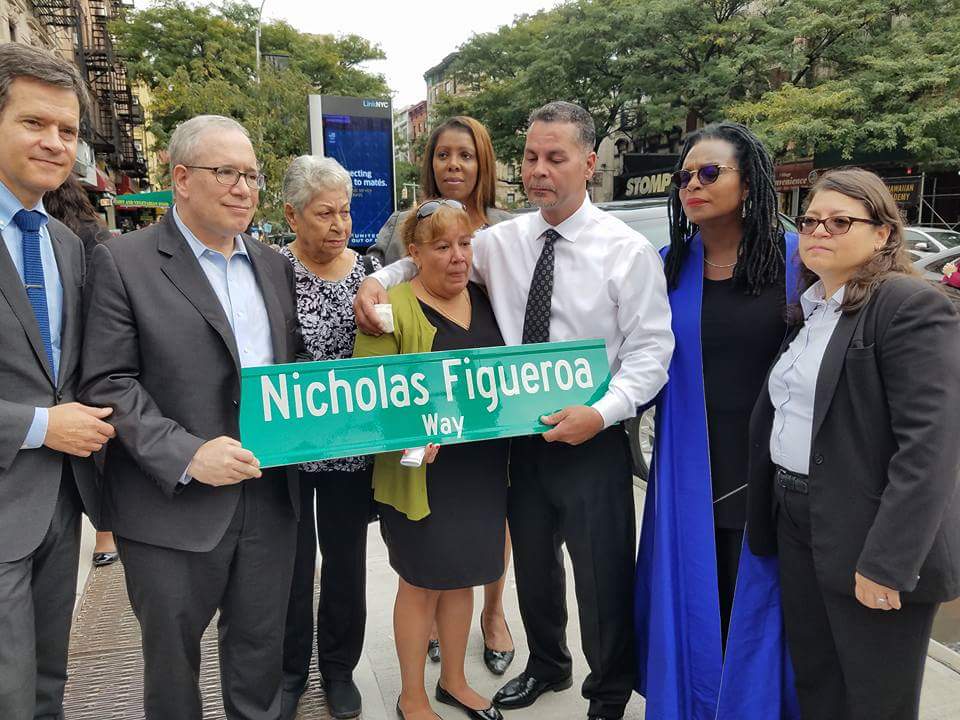
Sitting in the audience were Figueroa’s parents, Nixon Figueroa and Anna Lanza. After hearing the defense attorneys’ opening arguments — where they sought to shift the blame off the defendants — she was asked by a reporter if she felt the accused were guilty.
“Definitely,” she said.
This past January, Andrew Trombettas, a licensed plumber who allowed his license to be used to submit paperwork for the buildings’ gas system, pleaded guilty to offering a false instrument for filing in the first degree. He was sentenced to three years’ probation with 100 hours of community service.



